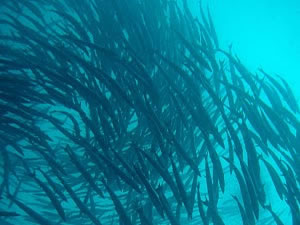
Scientists hail Marine reserves 'a success'
Thu 25 Feb
Scientists hail Marine reserves 'a success'

By Roy Weavers
A new study demonstrates that fish stocks, sharks and dugongs have benefited greatly from the protected marine reserves established on the Great Barrier Reef five years ago.
The research found rapid increases in fish and some shark populations inside marine reserves where fishing is prohibited.
It also found the no-fishing zones that were located in areas where threatened species such as dugongs and marine turtles frequent had helped eliminate associated hazards such as fishing nets.
Lead author of the study, published in the journal Proceedings of the US National Academy of Sciences, Dr Laurence McCook says the number of coral trout doubled in some reserves within two years of the fishing bans.
"The resounding pattern overall is there are more and bigger fish in the protected areas than the fished areas," said Dr McCook, from the ARC Centre of Excellence for Coral Reef Studies.
He says red throat empire and red empire numbers were also up. "Bigger fish have more babies and they produce more off-spring."
The study found larger, more mobile species, such as sharks, have been slower to recover but grey reef sharks were 30 times more abundant in protected reefs compared with fished reefs. Dr McCook said there were also increases in white-tipped and black-tipped shark populations. He said this marine reserve benefits the overall health and resilience of marine ecosystems.
Dr Josh Cinner, of the ARC Centre of Excellence for Coral Reef Studies, says reserves worked best when there has been a formal consultation processes about the rules, and locals were included in monitoring the reserve.
He said ongoing training to educate locals in the science and policy behind reserves also helped.
"Park agencies need to foster conditions that enable people to work together to protect their local environment voluntarily, rather than focusing purely on regulations and patrols," he said.